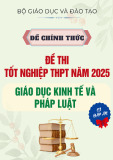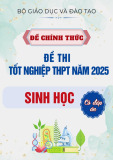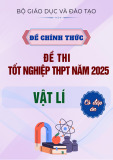
Đ THI THỀ Ử
PHÁT TRI N Đ MINH H AỂ Ề Ọ
Đ 37Ề
(Đ thi có 04 trang)ề
K THI T T NGHI P TRUNG H C PH THÔNG 2022Ỳ Ố Ệ Ọ Ổ
Bài thi: NGO I NG ; Môn thi: TI NG ANHẠ Ữ Ế
Th i gian làm bài: 60 phút, không k th i gian phát đờ ể ờ ề
H , tên thí sinh………………………………………………………………………ọ
S báo danh: ....................................................................................................................ố
Mark the letter A, B, C, or D on your answer sheet to indicate the correct answer to each of the following
questions.
Question 1: There is too much in this world.
A. greediness B. greed C. greedy D. greedness
Question 2: They haven’t finished their homework, ______?
A. do they B. haven’t they C. don’t they D. have they
Question 3: I can’t possibly lend you any more money, it is quite out of the .
A. order B. practice C. place D. question
Question 4: We will take an important exam __________ Tuesday next week.
A. In B. on C. at D. for
Question 5 : ______ are that stock price will go up in the coming months.
A. Chances B. Opportunities C. Possibilities D. Conditions
Question 6: They certainly knew that their task was difficult ______ two previous attempts had failed.
A. because B. although C. in spite of D. because of
Question 7: They take their ________ children to the park every day.
A. lovely African small young B. African small young lovely
C. Lovely small young African D. young lovely African small
Question 8: The Japanese market ______ 35 per cent of the company's revenue.
A. let in B. care for C. take in D. accounts for
Question 9. “You’re looking miserable.” “I ________on my assignment when my computer suddenly
crashed.”
A. used to work B. was working C. would work D. have been working
Question 10: She will send me the design of my new house ______.
A. after she had finished it B. while she was finishing it
C. as soon as she has finished it D. before she finished it
Question 11: He would win the race if he his brother's example and trained harder.
A. repeated B. set C. answered D. followed
Question 12: The biggest fear is that humans might ______ control over robots.
A. gain B. keep C. lose D. take
Question 13: The road to our village _____________ next year.
A. is widened B. will widened C. can widened D. will be widened
Question 14:: for 4 hours, they decided to stop to have lunch at a cheap restaurant.
A. Having been walked B. Having walked C. Walking D. Walked
Question 15: The more he slept,___________irritable he became.
A. the most B. the vey more C. much more D. the more
Mark the letter A, B, C, or D on your answer sheet to indicate the option that best completes each of the
following exchanges.
Question 16: Daisy wants to invite her classmate, Joe, to her birthday party.
- Daisy: “Listen, I am having a birthday party next Friday. Do you want to come?”
- Joe: “______ What time does it start?”
A. Sure, I’d love to. B. Sorry. I’m busy then.
C. I can’t agree with you. D. I like a party.

Question 17: Hana and Jenifer are talking about a book they have just read.
- Hana: “The book is really interesting and educational.” - Jenifer: “______”
A. That’s nice of you to say so. B. I’d love it.
C. Don’t mention it. D. I couldn’t agree more.
Mark the letter A, B, C, or D on your answer sheet to indicate the word whose underlined part differs
from
Question 18: A. extended B. skipped C. looked D. watched
Question 19: A. suggest B. support C. summer D. survive
Mark the letter A, B, C, or D on your answer sheet to indicate the word that differs from the other three in
the position of primary stress in each of the following questions.
Question 20. A. struggle B. certain C. action D. police
Question 21. A. considerate B. continental C. territorial D. economic
Mark the letter A, B, C, or D on your answer sheet to indicate the word(s) CLOSEST in meaning to
the underlined word(s) in each of the following questions.
Question 22: Face-to-face socializing is not as preferred as virtual socializing among the youth.
A. instant B. available C. direct D. facial
Question 23: The 1960s building boom in Zürich completely changed the rural landscape.
A. thoroughly B. quickly C. easily D. highly
Mark the letter A, B, C, or D on your answer sheet to indicate the word(s) OPPOSITE in meaning to the
underlined word(s) in each of the following questions.
Question 24: Jane found herself in conflict with her parents over her future career.
A. disagreement B. harmony C. controversy D. fighting
Question 25: I didn’t tell her that he was sick because I didn’t want to cause her any alarm.
A. worry B. inform C. comfort D. warn
Mark the letter A, B, C, or D on your answer sheet to indicate the sentence that best combines each pair
of sentences in the following questions
Question 26: Jack bought that second-hand car. He then recognized that he shouldn't have done that.
A. Jack wished that he has not bought that second-hand car.
B. Jack wished that he did not buy that second-hand car.
C. Jack regretted to buy that second-hand car.
D. If only Jack hadn’t bought that second-hand car.
Question 27 : Seth informed us of his retirement from the company. He did it when arriving at the meeting.
A. Only after his retiring from the company did Seth tell us about his arrival at the meeting.
B. Not until Seth said to us that he would leave the company did he turn up at the meeting
C. Hardly had Seth notified us of his retiring from the company when he arrived at the meeting.
D. No sooner had Seth arrived at the meeting than we were told about his leaving the company.
Mark the letter A, B, C, or D on your answer sheet to indicate the underlined part that needs correction in
each of the following questions.
Question 28: Peter and David are playing the piano in the living room in the morning yesterday
A B C D
Question 29: Upon reaching the destination, a number of personnel are expected to change its
A B C
reservations and proceed to Hawaii.
D
Question 30: In Italy public opinion as a whole was favourite to the visit, especially as it was not
A B C
considered an obstacle to the protected increase of the army and navy
D

Mark the letter A, B, C, or D on your answer sheet to indicate the sentence that is closest in meaning to
each of the following questions.
Question 31: You are required to clean the house instead of your brother
A. you needn’t clean the house instead of your brother
B. You must clean the house instead of your brother
C. You don’t have to clean the house instead of your brother
D. You might clean the hosue instead of your brother
Question 32: “We have a lift very often but it doesn’t work. ”, he said.
A. He said we have a lift very often but it doesn’t work.
B. He said they had a lift very often but it doesn’t work.
C. He said they had a lift very often but it didn’t work.
D. He said we had a lift very often but it didn’t work.
Question 33: I haven’t stayed in a hotel for years.
A. It’s years since I stayed in a hotel. B. It’s years when I stayed in a hotel.
C. It’s years since I stay in a hotel. D. I haven’t stayed in a hotel years ago.
Read the following passage and mark the letter A, B, C, or D on your answer sheet to indicate the correct
word or phrase that best fits each of the numbered blanks from 34 to 38.
Spectacular, played today on all kinds of surfaces by tens of millions of people, for fun or in competition,
tennis has spread (34) ______ over the world. Designed and codified in England in the 1870s, it is the direct
descendant of jeu de paume, invented in France in the 11th century. The developments of this mediaeval
(35) ______,originally practised with bare hands, like the invention of the racket in the 16th century and the
special scoring system (15, 30, 40, game), led directly to tennis, (36) ______ its name, from the French word
“tenez!” (in the sense of “here it comes!”), which you said to your opponent as you were about to serve.
The popularity of tennis in England quickly (37) ______ that of croquet. Indeed, barely three years passed
between the publication of A Portable Court of Playing Tennis by Welsh Major Walter Clopton Wingfield in
1874, the defining work in terms of codifying lawn tennis, and the holding of the first Wimbledon
tournament in 1877. The decisive element introduced by Wingfield was the use of a rubber ball, (38) ______
could bounce on grass.
(Adapted from https://www.olympic.org/)
Question 34: A. each B. any C. all D. every
Question 35: A. score B. screw C. smoke D. sport
Question 36: A. including B. before C. without D. except
Question 37: A. pretended B. overtook C. pressured D. guided
Question 38: A. which B. that C. what D. where
Read the following passage and mark the letter A, B, C, or D on your answer sheet to indicate the correct
answer to each of the questions from 39 to 43.
Health promotion and disease prevention programs focus on keeping people healthy. Health promotion
programs aim to engage and empower individuals and communities to choose healthy behaviours and make
changes that reduce the risk of developing chronic diseases and other morbidities. Defined by the World
Health Organization, health promotion is: “The process of enabling people to increase control over, and to
improve, their health. It moves beyond a focus on individual behaviour towards a wide range of social and
environmental interventions.”
Disease prevention differs from health promotion because it focuses on specific efforts aimed at reducing
the development and severity of chronic diseases and other morbidities.
Wellness is related to health promotion and disease prevention. Wellness is described as the attitudes and
active decisions made by an individual that contribute to positive health behaviours and outcomes.
Health promotion and disease prevention programs often address social determinants of health, which
influence modifiable risk behaviours. Social determinants of health are the economic, social, cultural, and
political conditions in which people are born, grow, and live that affect health status. Modifiable risk
behaviours include, for example, tobacco use, poor eating habits, and lack of physical activity, which

contribute to the development of chronic disease.
(Adapted from https://www.ruralhealthinfo.org/)
Question 39: Which best serves as the title for the passage?
A. Understanding Health Promotion
B. Social Determinants of Health
C. Defining Health Promotion and Disease Prevention
D. What do you know about disease prevention?
Question 40: The word “empower” in paragraph 1 is closest in meaning to ______.
A. affect B. pursue C. allow D. insist
Question 41: What does disease prevention focus on?
A. Wide range of social and environmental interventions
B. Specific efforts reducing the development and severity of chronic diseases
C. Attitudes and active decisions made by an individual
D. Positive health behaviours and outcomes
Question 42: The word “that” in paragraph 3 refers to ______.
A. attitudes active decisions B. wellness
C. health behaviours D. outcomes
Question 43: According to the last paragraph, modifiable risk behaviours contribute to the development of
______.
A. tobacco use B. eating habits
C. physical activity D. chronic diseases
Read the following passage and mark the letter A, B, C, or D on your answer sheet to indicate the
correct answer to each of the questions from 44 to 50.
We get great pleasure from reading. The more advanced a man is, the greater delight he will find in
reading. The ordinary man may think that subjects like philosophy or science are very difficult and that if
philosophers and scientists read these subjects, it is not for pleasure. But this is not true. The mathematician
finds the same pleasure in his mathematics as the school boy in an adventure story. For both, it is a play of
the imagination, a mental recreation and exercise.
The pleasure derived from this activity is common to all kinds of reading. But different types of books
give us different types of pleasure. First in order of popularity is novel-reading. Novels contain pictures of
imaginary people in imaginary situations, and give us an opportunity of escaping into a new world very
much like our world and yet different from it. Here we seem to live a new life, and the experience of this
new life gives us a thrill of pleasure.
Next in order of popularity are travel books, biographies and memoirs. These tell us tales of places we
have not seen and of great men in whom we are interested. Some of these books are as wonderful as novels,
and they have an added value that they are true. Such books give us knowledge, and we also find immense
pleasure in knowing details of lands we have not seen and of great men we have only heard of.
Reading is one of the greatest enjoyments of life. To book-lovers, nothing is more fascinating than a
favorite book. And, the ordinary educated man who is interested and absorbed in his daily occupation wants
to occasionally escape from his drudgery into the wonderland of books for recreation and refreshment.
Question 44: What does the passage mainly discuss?
A. Different types of books B. Different kinds of reading
C. Reading as an exercise for the brain D. Reading as a pleasurable activity
Question 45: According to paragraph 1, which of the following is NOT true?
A. Ordinary people may think that philosophy and science are difficult.
B. Reading about mathematics is mentally entertaining for a mathematician.
C. Philosophers and scientists do not read for pleasure.
D. A more advanced person takes greater pleasure in reading.
Question 46: The word “derived” in paragraph 2 is closest in meaning to ______.

A. differed B. established C. bought D. obtained
Question 47: The word “it” in paragraph 2 refers to ______.
A. a new life B. our world C. an opportunity D. a thrill of pleasure
Question 48: The word “immense” in paragraph 3 is closest in meaning to ______.
A. great B. limited C. personal D. controlled
Question 49: According to the passage, travel books, biographies and memoirs ______.
A. are wonderful novels B. tell stories of well-known places
C. are less popular than novels D. are more valuable than novels
Question 50: According to paragraph 4, which of the following is the most fascinating to booklovers?
A. A daily occupation B. An ordinary educated man
C. The wonderland D. A favorite book

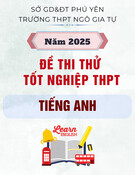


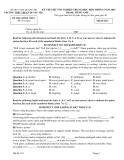
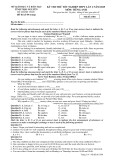
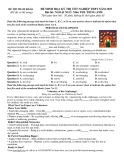
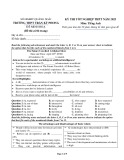
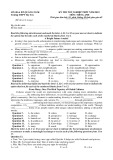
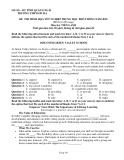
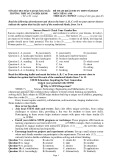







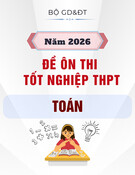

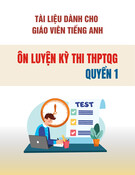
![Đề thi tiếng Anh tốt nghiệp THPT 2025 (Chính thức) kèm đáp án [mới nhất]](https://cdn.tailieu.vn/images/document/thumbnail/2025/20250627/laphong0906/135x160/9121751018473.jpg)

